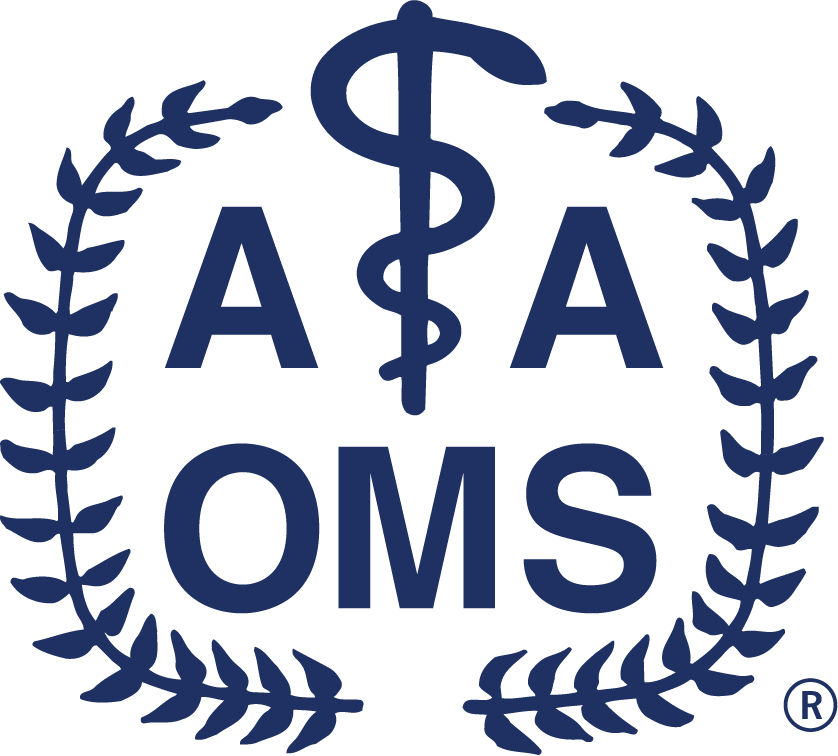
Medication Access and Training Expansion (MATE) Act
Below is a list of AAOMS’s current CE online offerings that appear to count toward the eight hours required by the Medication Access and Training Expansion (MATE) Act. For a limited time, AAOMS Members can register for all of the eligible courses complimentary as a member benefit. More information on the MATE Act requirements can be found here on AAOMS.org (you must be logged in to access).
-
Contains 6 Component(s), Includes Credits
The Medication Access and Training Expansion (MATE) Act requires practitioners to meet specific training requirements tied to their initial or renewal DEA registration. This 90-minute webinar – which appears to fulfill 1.5 hours of the eight-hour requirement of the MATE Act – provides training on how to treat and manage patients with opioid or other substance use disorders (SUDs), including use of drugs approved by the FDA for the treatment of a substance use disorder. The webinar will address safe pharmacological management of dental pain and screening, brief intervention, and referral for appropriate treatment of patients with, or at risk of developing, opioid or other substance use disorders. The potential clinical implications of patients with SUDs also will be discussed. Code: WCE230621R
-
You must log in to register
- Member - Free!
- Resident Member - Free!
- Allied Staff Member - Free!
- Professional Staff Nonmember - $180
- Other Nonmember - $180
- Practice Management CE Subscriber - Free!
- CE Subscriber (Clinical & PM) - Free!
- More Information
-
You must log in to register
-
Contains 6 Component(s), Includes Credits
Opioids are commonly prescribed for postoperative pain control after both minor and major surgical procedures. Minor oral surgical procedures, such as third molar removal, are often a patient's first exposure to surgery and first exposure to opioid medication. Although many times opioids are necessary for adequate pain management, data have shown many patients receive more opioids than are necessary to relieve pain after a minor procedure. This session will focus on strategies to reduce the amount of opioid medication prescribed for minor procedures in the oral and maxillofacial surgical practice. Alternative postoperative medications will be discussed. The use of injected submucosal medication to lessen the amount of postoperative analgesics needed also will be presented. The addition of innovative postoperative pain control approaches can help make the oral and maxillofacial surgical practice less reliant on opioid medication for pain management. Code: ODAM21GP4C
-
You must log in to register
- Member - Free!
- Resident Member - Free!
- Allied Staff Member - Free!
- Professional Staff Nonmember - $240
- Other Nonmember - $240
- Practice Management CE Subscriber - Free!
- CE Subscriber (Clinical & PM) - Free!
- More Information
-
You must log in to register
-
Contains 6 Component(s), Includes Credits
The opioid epidemic continues to take a punishing toll on individuals, families and communities around the country. The COVID-19 pandemic has magnified the opioid epidemic’s impact. In the face of this, oral and maxillofacial surgeons and their teams have adopted safe opioid prescribing practices. The epidemic is evolving and so must the response. This 90-minute webinar will update participants on opioid and other substance use and provide actionable steps to build on safe opioid prescribing with universal screening, reducing stigma and supporting recovery. Code: WPM210427R
-
You must log in to register
- Member - Free!
- Resident Member - Free!
- Allied Staff Member - Free!
- Professional Staff Nonmember - $265
- Other Nonmember - $265
- Practice Management CE Subscriber - Free!
- CE Subscriber (Clinical & PM) - Free!
- More Information
-
You must log in to register
-
Contains 6 Component(s), Includes Credits
Dr. Kolodny provides an overview of the prescription opioid and heroin crisis. He explains the relationship between opioid prescribing and rising rates of morbidity and mortality associated with prescription opioids, heroin and fentanyl. Factors that led to the epidemic — including the role of the pharmaceutical industry, healthcare providers, professional organizations and regulatory agencies — are explored. The role of opioids in treatment of post-surgical dental pain and other types of acute and chronic non-cancer pain are also evaluated, and strategies required to bring the epidemic under control are discussed. Code: ODAM17GSE1
-
You must log in to register
- Member - Free!
- Resident Member - Free!
- Allied Staff Member - $60
- Professional Staff Nonmember - $120
- Other Nonmember - $120
- Practice Management CE Subscriber - $60
- CE Subscriber (Clinical & PM) - Free!
- More Information
-
You must log in to register
-
Contains 6 Component(s), Includes Credits
The nation is under the grip of an epidemic of abuse and addiction to opioids such as heroin, morphine and prescription pain relievers. An estimated 26 million to 36 million people abuse opioids worldwide, with 2.1 million people in the U.S. suffering from substance use disorders related to prescription opioid pain relievers in 2012 and an estimated 467,000 addicted to heroin. Code: WCE170510R
-
You must log in to register
- Member - Free!
- Resident Member - Free!
- Allied Staff Member - $60
- Professional Staff Nonmember - $120
- Other Nonmember - $120
- Practice Management CE Subscriber - $60
- CE Subscriber (Clinical & PM) - Free!
- More Information
-
You must log in to register
-
Contains 6 Component(s), Includes Credits
Substance abuse is quite common—more common than many practitioners realize. It is not unexpected that the oral and maxillofacial surgeon will need to care for the substance abusing patient in day to day office practice. During this module, the attendee will gain an understanding of the mechanisms of action of commonly abused substances and the physiologic side effects of these substances. The potential interactions between these substances and intravenous sedation agents as well as the potential paradoxical reactions to sedation that may be seen in the substance abuse patient will be discussed. Code: ODAM15AM02
-
You must log in to register
- Member - $60
- Resident Member - Free!
- Allied Staff Member - $60
- Professional Staff Nonmember - $120
- Other Nonmember - $120
- Practice Management CE Subscriber - $60
- CE Subscriber (Clinical & PM) - Free!
- More Information
-
You must log in to register
| Access Date | Quiz Result | Score | Actions |
|---|
Featured Courses
Check out the new featured courses!
Special CE Online Discounts
Enjoy new CE Online offerings by visiting our Special CE Online Discounts page!
Medication Access and Training Expansion (MATE) Act
Visit CEonline.AAOMS.org/MATEAct for a list of AAOMS’s current CE online offerings that appear to count toward the eight hours required by the MATE Act. For a limited time, these courses are offered complimentary to AAOMS Members.


